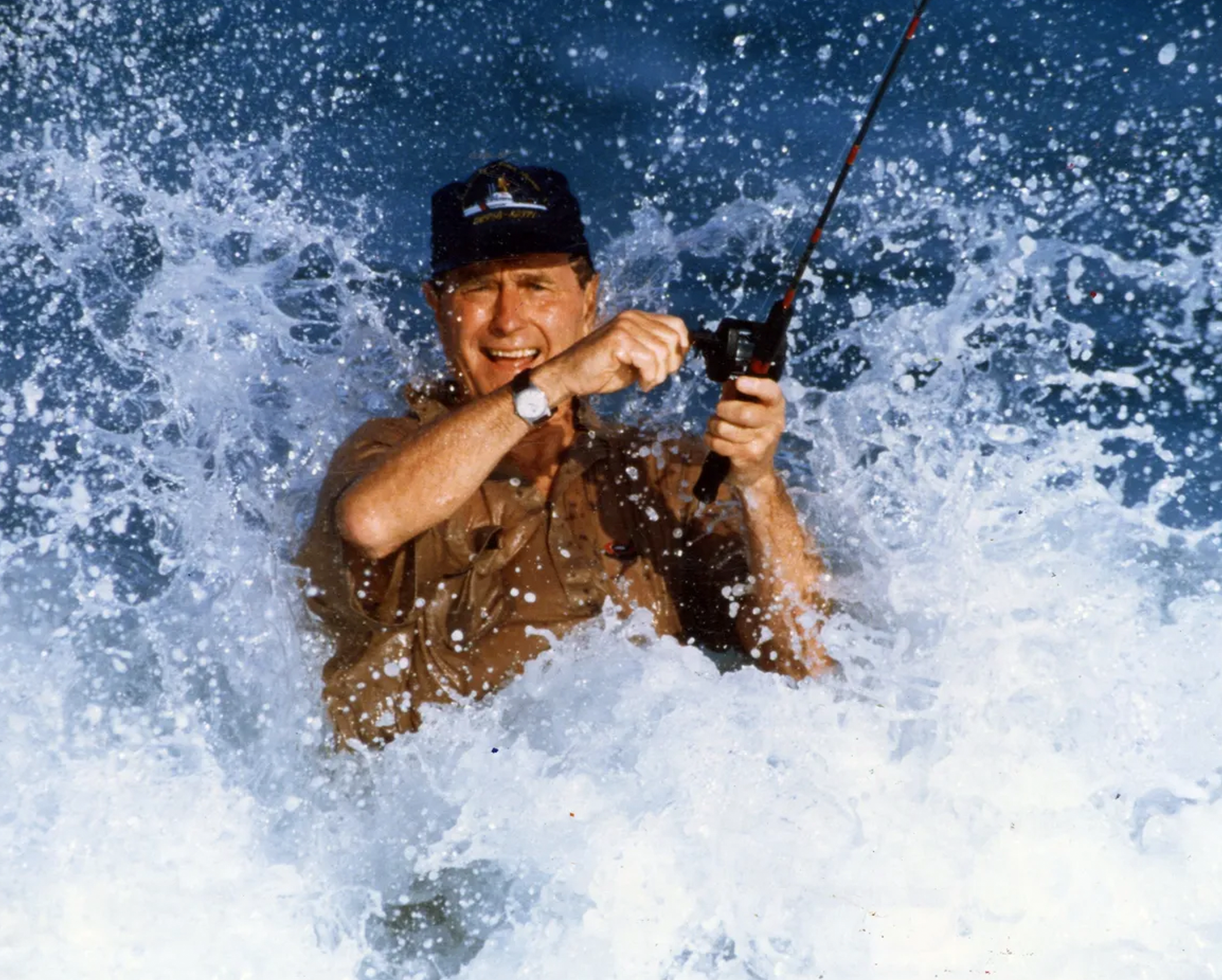

This month, June 12 to be precise, marks what would be President George H.W. Bush’s 100th birthday. The former Commander in Chief who, later in life, became known simply as “41,” passed away in 2018 at the age of 94, but his legacy and love for not only our country but also the outdoors lives on.
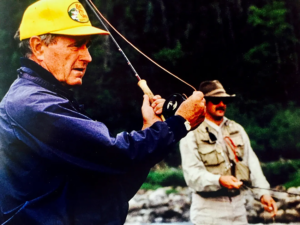
George H.W. Bush on a fly fishing trip with Ken Raynor. The two men met in the late 1970s when Raynor was the head pro at Cape Arundel Golf Club in Kennebunkport, Maine and became dear friends. Mr. Bush’s son and 43rd President, George W. Bush, calls Raynor “a member of the family.”
JACKET is based in Delray Beach, Florida, a coastal town that enjoyed such a tremendous connection with the 41st President of the United States over the years that, in 1989, it named a street in his honor.
George H.W. Bush is arguably the most decorated and accomplished public servant our nation has known. That is not a reference to his politics — those debates belong somewhere other than a sunscreen blog — but to his unprecedented and unmatched experiences, character and commitment to America — the country he proudly fought for from literally the first moment he was able.
On his 18th birthday (June 12, 1942), just six months after the Japanese attack on Pearl Harbor, George H.W. Bush enlisted in the U.S. Navy, and soon became the youngest pilot in American naval history, earning his wings just shy of his 19th birthday.
The son of Prescott Bush, a banker and U.S. Senator from Connecticut, and Dorothy Walker Bush, the daughter of a prominent St. Louis banker named George Herbert Walker, young George H.W. Bush surely had options upon graduating high school, but the call of serving his country and defending freedom around the world was too compelling to ignore.
“That was World War II. Everybody wanted to fight for his country,” Mr. Bush recalled to interviewer Hugh Sidey in 1996. “The country was together. Good versus evil. Most people couldn’t wait to help defeat the Emperor (Hirohito of Japan) and the Führer (Adolf Hitler of Germany).”
Just two years later, on September 2, 1944, a barely-20-year-old George H.W. Bush was shot down by Japanese anti-aircraft fire over the island of Chi Chi Jima in the Pacific Ocean. Forced to eject from his burning jet, the young aviator splashed down in the water, releasing his tattered parachute and clinging to an inflatable raft (his seat cushion) before being rescued a few hours later by a U.S. submarine (USS Finback) that, fortunately, was in the area and would become his “home” for the next month. Had that been an enemy vessel, American history likely would have been drastically different. The standard practice of the day was for captured pilots to be executed, and eyewitness accounts indicated that several Japanese boats had been deployed to find and capture the fallen pilot, but were fended off by U.S. Hellcat fighter jets circling above.
Mr. Bush’s two fellow crewmen — a radioman named John Delaney and a gunner by the name of William (Ted) White — did not survive the encounter; a realization and impact that he would carry throughout his life and on which he elaborated during many conversations and interviews over the years.
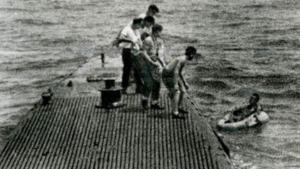
George H.W. Bush is rescued at sea by the crew of the USS Finback after being shot down in the Pacific Ocean. Photo courtesy of CBS News
“That experience shaped my life more than any other incident. I was terrified and it made me feel closer to my family, to God, and to life. I sat in that raft and sobbed for a while. There is great sadness with the loss of two men who were depending on me. I count my blessings but have always wondered why my life was spared and two friends with me in the plane were killed. You think about, ‘What does God have in store for me?’.”
In a letter penned by young George H.W. Bush to his parents while living in the Finback, he wrote of Delaney and White, “It bothers me so very much. I feel so terribly responsible for their fate right now. Perhaps as the days go by it will all change and I will be able to look upon it in a different light.”
Those closest to him know it never did.
George H.W. Bush’s decorated World War II naval career — which included nearly 60 missions, 128 aircraft carrier landings and more than 1,200 hours of flight time — ended in September 1945 following a formal Japanese surrender.
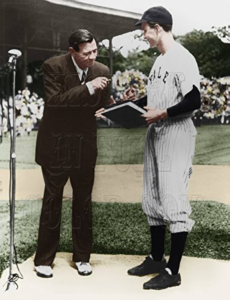
As Captain of the Yale baseball team, George H.W. Bush met the legendary Babe Ruth when he visited New Haven to donate a copy of his autobiography to the university library. Ruth died a few months later.
After returning to the mainland, George H.W. Bush attended Yale University in New Haven, Connecticut, where he graduated Phi Beta Kappa in less than three years, earning a degree in economics. He was also the captain of the Yale baseball team and led the Bulldogs to back-to-back College World Series appearances in 1947 and 1948. Nearly 80 years later, those are still the only trips ever made to the College World Series by the Ivy League school. Today, the baseball stadium at Yale bears his name.
Perhaps in a bit of foreshadowing, George H.W. Bush was elected president of his fraternity (Delta Kappa Epsilon).
By the time George H.W. Bush enrolled at Yale, he had already married Barbara Pierce Bush, a New Yorker he met at a Christmas dance while in the Navy, and the couple welcomed their first child (George Walker Bush) during their years in New Haven.
Upon graduating in 1948, the now Bush family headed west to Odessa, Texas, to pursue a career in the oil business. A town that Mr. Bush admitted he had never heard of prior to being offered a job there.
The safe play at the time was to stay in the Northeast and enjoy a lucrative career in the banking business — perhaps even a spectacular office on Wall Street. But that wasn’t part of George H.W. Bush’s vision. Perhaps the outdoorsman and adventurous spirit in him could not be confined to four walls. He needed the wonder of the Wild West.
His brother, Jonathan Bush, acknowledged as much in the book, “My Father My President,” authored by George H.W. and Barbara Bush’s daughter, Dorothy (Doro) Bush Koch, in 2006.
“He wanted to do something,” Jonathan Bush shared. “He saw himself sitting behind a desk and balancing somebody’s checking account. He just didn’t want to do it.”
In the same book, Barbara Bush revealed what drove her husband’s determination to explore new frontiers.
“He did not want to work in a bank,” Mrs. Bush recalled. “He decided that on the submarine when, at night, he’d be on the deck looking at the stars (during surfacing opportunities).”
“Stars so big you felt like you could touch them,” Mr. Bush once told a television interviewer.
This insight shows the power of the outdoors to inspire and, throughout his life, it gripped George H.W. Bush as strongly as the call to serve. And he would call on its peace and beauty as often as he could, but never as often as he’d like.
Over the next 15 years, George H.W. Bush created or became involved with multiple companies and moved his family from the plains and tumbleweeds of West Texas to the hustle and bustle of Houston.
Of their time in Odessa, Mr. Bush said: “We had a wonderful life there, and we learned a lot about people. Not where they were educated or what their pedigree was. What are their values? Do they work hard? Are they kind? Do they help others? All of that was in great, broad colors when we lived there.”
The Bushes would not only enjoy great professional success while living in Houston, but also expansion at home. By 1959, the Bush brood included six children — George, Robin (who died of leukemia in 1953 prior to her fourth birthday), Jeb, Marvin, Neil and Dorothy. It was also shortly after the move to Houston that George H.W. Bush once again felt the tug of public service.
Despite a failed U.S. Senate bid in 1964 — Texas was overwhelmingly a Democrat state at that time, so a Republican losing was not exactly breaking news as it might be today — George H.W. Bush emerged from the campaign as a star on the rise in the Republican Party, and somebody who political opponents would have to keep an eye on.
The sentiment and enthusiasm catapulted George H.W. Bush to two successive U.S. Congressional terms, where he represented Houston’s seventh district. With his star now no longer limited to his adopted state of Texas, George H.W. Bush soon became a force on the national stage as well.
He was appointed Ambassador to the United Nations in 1971, a post he would hold for two years, gaining invaluable foreign-policy experience. George H.W. Bush was then named Chairman of the Republican National Committee, where he made history by officially recommending to embattled President Richard Nixon that he should resign; which he did shortly thereafter. Despite many pleas to protect the party and its most powerful figure, George H.W. Bush held resolute in his convictions and principles, placing country over politics and bringing an end to a dark period in U.S. history.
Saddened by the situation but undeterred by the political environment in his beloved homeland, George H.W. Bush headed overseas, where he would serve as the United States’ Chief Liaison (Ambassador) to China during a very pivotal period for both countries. This provided George H.W. Bush with an even greater understanding and appreciation of the role and significance the U.S. plays around the world — experiences that would continue to serve him well throughout his career.
After more than a year living in China, George H.W. Bush returned to the U.S. and moved to Washington, D.C. for a one-year stint as Director of the Central Intelligence Agency (CIA). At the time, the CIA was in need of damage control and restructuring following some controversies in previous years, and George H.W. Bush was able to restore stability, respect and confidence in and for the American intelligence community.
Next up for George H.W. Bush was a formidable Presidential primary contest with California Governor Ronald Reagan for the 1980 Republican nomination. The strong showing and runner-up finish earned George H.W. Bush the party’s Vice Presidential nomination, and the Reagan-Bush ticket would go on to handily defeat incumbent President Jimmy Carter and Vice President Walter Mondale.
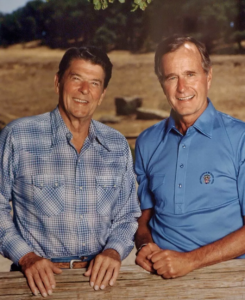
George H.W. Bush served eight years as Vice President under Ronald Reagan before becoming the 41st President of the United States.
The Reagan-Bush ticket would secure re-election four years later with a landslide victory over Democrat challengers Walter Mondale and Geraldine Ferraro, winning 49 out of a possible 50 states and amassing 525 electoral votes to their opponents’ 13.
Although Ronald Reagan became one of the most iconic presidents in American history, George H.W. Bush is widely regarded as one of the most influential and effective Vice Presidents to ever hold the office. His experience and expertise on countless matters of import, including foreign affairs, as well as his steadfast support of and loyalty to the man and office he served under further solidified that reputation, and those sentiments have only intensified over time.
In 1988, George H.W. Bush would attain the greatest office and highest honor in public service, as he was elected President of the United States. He, along with running mate Dan Quayle, a Senator from Indiana, defeated the Democrat ticket of Michael Dukakis and Lloyd Bentsen.
As if a presidential election needed more historic value, thanks to George H.W. Bush, this one did. Not only was this America’s bicentennial election, but the victory made Bush the first sitting Vice President in more than 150 years (Martin Van Buren, 1836) to be elected President.
The outcome likely provided a bit of additional personal value for George H.W. Bush as well. Although raised to be humble, speak ill of nobody, and not be vengeful, the Bushes are a fiercely competitive crew.

President Bush waves to reporters upon landing at the White House. It was not uncommon for him to read fishing, golf and other outdoors publications, such as this BASSMASTER Magazine, when traveling.
The Democratic nominee for President in ‘88, Michael Dukakis, was the governor of Massachusetts, which is actually the birthplace (Milton) of George H.W. Bush, so defending home court likely put a feather — even if only subconsciously — in his cap. Dukakis’ running mate, Lloyd Bentsen, a prominent and popular Texan, had actually defeated George H.W. Bush in a Senate race nearly 30 years earlier.
This scenario beautifully symbolizes the very way in which George H.W. Bush approached everything in life. When adversity strikes, you get back to work and see where it leads. In this instance, it led to a redemptive rematch on the world’s grandest stage.
George H.W. Bush was denied a second term as President, losing in 1992 to challenger Bill Clinton, then the Governor of Arkansas, and his Vice Presidential running mate, Al Gore, a Senator from Tennessee.
Despite the agony, sorrow and second-guessing that human nature demands we feel in moments such as these, now former President George H.W. Bush charged ahead with the character and dignity you would expect of the man, saying:
“It hurt, but you work your hardest, tell the truth, try to give it your best shot, don’t take it too personally, and get on with your life. There is important work to be done, and America must always come first. So, we will get behind this new President and wish him well. As for me, I will serve and try to find ways to help people.”
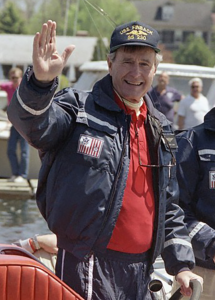
George H.W. Bush waves to a crowd before heading out on his boat for a day of fishing. Notice the hat — a tribute to the USS Finback.
Upon leaving the White House, Mr. Bush left a personal note for his successor in the Oval Office, a tradition that originated with President Reagan and remains today. Interestingly, George H.W. Bush was the first outgoing President who penned such a message to an individual he lost to.
Of that handwritten note, President Clinton told ABC News, “I love that letter. It was vintage George Bush, and he was trying to be a citizen in the highest sense of the word. It was profoundly moving to me, personally.”
Despite exiting the White House sooner than hoped, George H.W. Bush’s term was not short on accomplishment, most notably the collapse of the Berlin Wall and dissolvement of the Soviet Union, signifying the end of the Cold War. There was also Operation Desert Storm (Persian Gulf War), a U.S.-led coalition that freed Kuwait from Iraqi invasion.
President George H.W. Bush also signed multiple, multi-nation nuclear arms reduction agreements; the Clean Air Act and Immigration Act of 1990; the 1991 Civil Rights Act; and what the former President referred to as his proudest piece of legislation, the Americans with Disabilities Act (1990), ensuring equal accessibility and discrimination protection for nearly 50 million Americans at the time.
For his unwavering dedication to his country, George H.W. Bush was presented the Presidential Medal of Freedom by Barack Obama in 2011.
George H.W. Bush lived a life of service, but he was a sportsman as much as he was a statesman. Athletic and adventurous, the outdoors were always a special place for George H.W. Bush — from his days as a youngster until well into his post-Presidency, when a 2012 Vascular Parkinsonism diagnosis eventually robbed him of his mobility and ultimately confined him to a wheelchair in his final years.
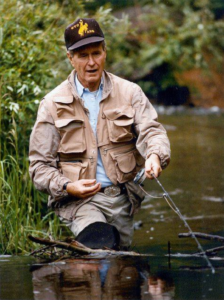
George H.W. Bush wading in a river during a fly fishing trip. Mr. Bush always said you learn a lot about somebody when you play 18 holes or cast a rod side by side with them for a day.`
This would be a devastating blow for any individual, but particularly so, you’d imagine, for one who lived such an active lifestyle and had always been heavily involved in athletics, competition, fitness and the outdoors.
However, according to long-time friend, golf partner and fishing buddy Ken Raynor, Mr. Bush handled the adversity just as those who best knew him expected.
“He has a passion for everything he does and the people he does it with,” said Raynor, in his book “I Call Him ‘Mr. President,’ Stories of Golf, Fishing and Life with My Friend,” published in 2017. “Even as his body began to fail, the spirit in his heart never wavered. Just being outdoors with friends and family, in a beautiful landscape, kept him ‘in the action’ and happy.”
It’s fair to say that no President has done more to promote, support and enjoy the outdoors than 41 — this became the 41st President’s nickname after his son, George W. Bush, was elected the 43rd President of the United States in 2000. Much of this affinity was instilled in George H.W. Bush as a child. His mother, Dorothy, was a remarkable athlete and accomplished amateur tennis player, and she insisted that each of her five children compete hard, play fair and always remain humble, regardless of the performance or result.
Dorothy’s father, George Herbert Walker — 41’s namesake — was an avid golfer and served as President of the United States Golf Association (USGA). The famed Walker Cup, a biannual event pitting male amateur golfers from the U.S. against their counterparts from Great Britain and Ireland, was named in his honor.
President Bush’s father, Prescott Bush, was an acclaimed athlete as well, having played both baseball and golf for Yale University. Like his father-in-law, Prescott Bush was also a member and President of the USGA.
You could say that George H.W. Bush was a chip off the ol’ block in that sense, playing both baseball and soccer at the collegiate level, and enjoying outdoor activities such as tennis, running, hunting, golf and fishing as often as his future schedule would allow. And as those closest to Mr. Bush would tell you, anything he sacrificed in quantity he more than made up for with quality. For George H.W. Bush, the outdoors brought serenity and joy to a demanding career, which was also greatly buoyed by his love of family and friends.
It was during Mr. Bush’s time as Vice President and, eventually President, that his passion for the outdoors and commitment to protecting and promoting them became evident. When your every move is a press event, hiding your hobbies and favorite activities is a futile effort.
Family vacations and retreats to the family’s famed summer home in Kennebunkport, Maine were designed for spending time with friends and loved ones — much of it on the water or on the golf course. George H.W. Bush had been coming to this home, known as Walker’s Point, since childhood and it’s no secret that it was his happy place.
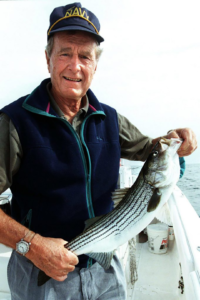
George H.W. Bush with a striped bass, or striper, that he caught off the coast of Maine.
The area is historically great for striped bass, salmon and trout, among others. And whether standing on the rock jetty extending into the Atlantic Ocean near his home; offshore, running the country’s Northeastern coast on Fidelity, his 38-foot speed boat; or scouring the banks of the Kennebunk River, George H.W. Bush hooked his fair share of fish.
And that was when he was “home.” George H.W. Bush had several good fishing buddies across the country and world, and trips to remote regions with rods at the ready were a way of life.
Some of 41’s favorite getaways were chasing char in the Arctic Circle’s Tree River, and salmon fishing in the Canadian province of Labrador — an annual adventure that included Ken Raynor and Bass Pro Shops founder Johnny Morris.
“He was definitely hard core, but it was more important that everybody had a good time,” said Raynor, who has fished all corners of the world with Mr. Bush. “We were there to fish, but for him it was about spending a day with Mother Nature and friends.”
Morris and George H.W. Bush took countless trips together during their decades-long friendship and, in 2014 on his 90th birthday, Morris presented his buddy with the Bass Pro Shops Lifetime Conservation Achievement Award.
“President Bush is a remarkable man who has had an immeasurably profound, positive impact on our nation’s fish and wildlife resources,” Morris announced at the time, making a donation to the Recreational Boating and Fishing Foundation in the former President’s honor as well. “He is a passionate fisherman and sportsman whose well-known love of fishing has made him one of the best ambassadors the sport of fishing has ever had.”
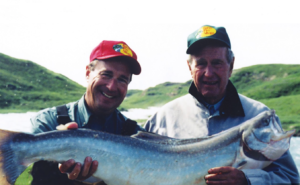
George H.W. Bush and good friend Johnny Morris, founder of Bass Pro Shops, with a salmon they hooked on one of their many adventures.
Morris also helped launch the George H.W. Bush Vamos A Pescar Education Fund, an outreach program focused on bringing fishing, boating and conservation activities to Hispanic communities. The fund is now part of the Take Me Fishing organization.
The Florida Keys was another of George H.W. Bush’s favorite fishing destinations, and he spent a tremendous amount of time there. In fact, the annual George Bush / Cheeca Lodge Bonefish Tournament was held in Islamorada from 1994 through 2003, raising funds and awareness for different organizations and efforts, including Florida Everglades conservation.
Mr. Bush enjoyed catching bonefish, snook, redfish and other species, but the goal was always to hook a “big ol’ tarpon.”
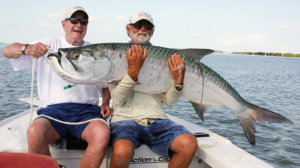
George H.W. Bush with a “big ‘ol tarpon” he caught in The Florida Keys with longtime friend and Islamorada fishing guide George Wood.
George H.W. Bush was also the first-ever recipient of the Keep America Fishing Lifetime Achievement Award presented by the American Sportfishing Association, and helped form the George H.W. Bush Conservation Fund in partnership with the National Fish and Wildlife Foundation. The fund supports conservation projects that benefit fish, wildlife and their habitats.
Mr. Bush was inducted to both the IGFA Fishing Hall of Fame and Bass Fishing Hall of Fame as well.
“Most people aren’t fully aware of all that President Bush has done for conservation,” said Morris. “During his presidency, he established 56 new wildlife refuges, more than even President Theodore Roosevelt, conserving more than three million acres of nationally significant public land.”
These lofty accolades and recognitions are not limited to fishing. In fact, George H.W. Bush’s ambassadorship for golf outdrives his angling efforts — not an easy task.
Mr. Bush was also elected to the World Golf Hall of Fame and received the PGA of America Distinguished Service Award and PGA Tour Lifetime Achievement Award. He was an honorary member of the PGA as well.
Unlike his father and grandfather, George H.W. Bush was never named USGA President, the governing body for golf in the U.S. He did, however, receive the organization’s Bob Jones Award, which is presented to individuals who display distinguished sportsmanship, attitude and spirit. It is the highest honor bestowed by the USGA. He was also honorary chair of the USGA Museum and Archives.
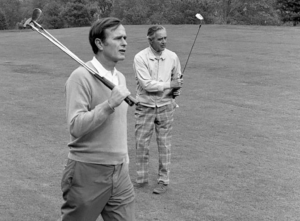
A younger George H.W. Bush playing a round of golf with his father, Prescott Bush, himself an exceptional golfer and former President of the USGA.
George H.W. Bush’s reputation as an avid golfer is certainly not confined to our shores. Universally considered “The Home of Golf,” The Royal and Ancient Golf Club of St. Andrews, located in Scotland, presented George H.W. Bush with an honorary membership as a tribute to his love, passion and advancement of the game.
Other golf-related recognitions included the Ambassador of Golf Award, and Mr. Bush participated in several ceremonial first tee shots and celebrity tournaments over the years. In fact, in 1996, he helped form his own annual event, the Bush Family Golf Classic, which is held at Cape Arundel Golf Club in Maine and benefits local organizations.
“If there was an opportunity for him to help grow the game of golf or to support another effort through golf, he was excited to do it,” said Raynor. “There were even times when he had been invited to participate in a golf event but his schedule wouldn’t allow him to. In those instances he would find other ways to get involved.”
That included more than a few times that Raynor — not only George H.W. Bush’s friend of nearly 40 years, but also the (now retired) head golf pro at Cape Arundel, as well as Coral Creek Club on Florida’s west coast — would tee it up among the who’s who’s of the world as “The President’s Pro” in his stead.
Want an idea as to how much golf meant to George H.W. Bush, who jokingly referred to himself as “Mr. Smooth” after a particularly good shot, and how important it was for him, personally, to represent the sport at a high level?
In 2007, Tiger Woods asked Mr. Bush, then 83, if he would hit the opening tee shot at an event he was hosting to benefit U.S. troops on the Fourth of July. Raynor attended the event, held at the Congressional Country Club near Washington, D.C. with Mr. Bush and said the former President told him that morning, “I spoke in front of a million people in Poland at the end of the Cold War and I wasn’t nervous one bit. Today, I am scared to death of hitting this tee shot.”
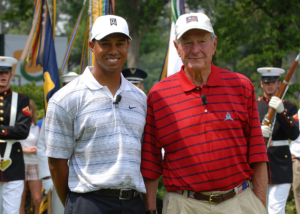
George H.W. Bush recalled meeting Tiger Woods for the first time many years ago and marveled at the tip he gave him for hitting bunker shots. The two reunited several times over the years, including this appearance at the inaugural Earl Woods Memorial Pro-Am Tournament.
For those wondering, after four disastrous hacks on the driving range, George H.W. Bush declared himself ready and proceeded to hit a 220-yard drive right down the middle of the fairway.
Mr. Bush’s friends group also included the biggest names in golf, and he demanded that his playing partners go full throttle — never take it easy on the old guy. He rooted for the course record to be broken anytime he was playing with golfers capable of doing so, of which he was not (his personal best handicap was 11).
“Every moment with him was filled with fun and competition, and you made memories that will last a lifetime,” said Raynor of Mr. Bush. “It was always about the experience for him, and it certainly was for those of us out there with him as well. It was always special.”
The great outdoors are such a significant piece of American history, and it’s vital that politicians and others continue fighting to preserve and protect these passions and spaces. There have been many such leaders over time, but none more enthusiastic or committed than George H.W. Bush.
We also all share an obligation to preserve our history, along with the names, faces and stories of the men and women who built our world, country, states and towns.

George H.W. Bush’s foursome this day included NFL icon and seven-time Super Bowl champion Tom Brady; former President Bill Clinton, who became a very close friend in the years after their election; and legendary CBS Sports commentator Jim Nantz, who has played dozens of rounds with Mr. Bush over the years.
“He is one of the grandest gentlemen I have ever had the pleasure to be around,” said Morris. “He had a passion for fish and wildlife, and he made a lasting impact for generations to come.”
As an outdoors company and sunscreen provider, we have such a great appreciation for all that George H.W. Bush did to showcase and support the lifestyle we embrace. JACKET was created because we enjoy time outdoors and want others to as well, and we don’t want to sacrifice our skin and health to do it. At JACKET, we are driven by passion, purpose and performance, and our mission is to ensure we can all maximize the action while minimizing the risk.
We draw motivation and inspiration from George H.W. Bush here as well. In 1986 while serving as Vice President, Mr. Bush made news by having skin cancer removed from his left cheek. Barbara Bush also underwent skin cancer procedures during her time as First Lady.
The American Academy of Dermatology recommends making sunscreen part of your daily routine. Preferably one that is broad spectrum (protects against both UVA and UVB rays), water resistant and has a minimum SPF of 30.
A broad spectrum, water resistant, SPF 50+ sunscreen, JACKET provides maximum protection from the sun’s harmful rays — greatly reducing the threat of sunburn and skin cancer. JACKET is lightweight, non-greasy, unscented and leaves no white cast, making it an ideal option for long days on the water, in the field, on the court or on the course. Developed by a South Florida dermatologist, JACKET is also the only anti-aging sunscreen that fades dark spots and smooths wrinkles while you wear it.
As a company founded in Delray Beach, Florida, we are thankful for our city’s relationship with George H.W. Bush — one that culminated with George Bush Boulevard being unveiled early on in his presidency.
Mr. Bush and his family had been familiar with Delray Beach for many years, especially after his parents began vacationing in (and eventually retiring to) Jupiter, Florida in the 1960s. Not surprisingly, however, it was sport and the outdoors that ultimately drew George H.W. Bush to town.
He had fished the waters, but a friendship with International Tennis Hall of Famer Chris Evert made Mr. Bush an annual visitor. One of the greatest female athletes of all time, Evert began hosting the Chris Evert Pro-Celebrity Tennis Classic at the Delray Beach Tennis Center in 1989. George H.W. Bush often participated, and the tournament has raised nearly $30 million for drug-abuse and child-neglect organizations.
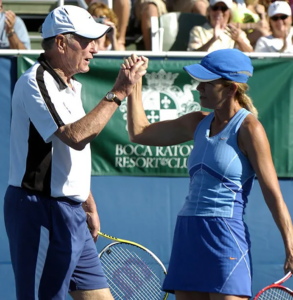
George H.W. Bush celebrates with friend and tennis great Chris Evert during one of the many annual celebrity tournaments he attended in Delray Beach, Florida over the years.
Be it for business or pleasure, there were many visits to the Sunshine State over the years for George H.W. Bush, including more than a few trips to see his son, Jeb Bush, a two-term governor of Florida.
George H.W. Bush valued the importance of the outdoors, which provided the peace and clarity he needed to lead. A life of service, a life of recreation, but greatest of all, a life of love. And there was nothing George H.W. Bush loved more than time outdoors with family and friends.
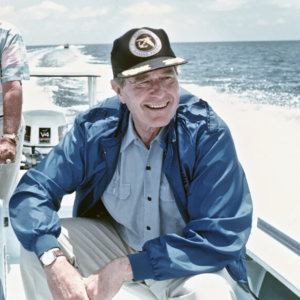
Former Olympic skier and friend Andy Mill said of George H.W. Bush, “He was one of the greatest enthusiasts I’ve ever fished with. He was a first-light-to-last-light kind of angler; never deterred by bad weather or getting skunked. I never heard him complain about anything, ever. There was always hope for tomorrow.”
As we remember George H.W. Bush on what would be his 100th birthday, let us heed the advice he shared after skydiving on his 85th birthday — a feat he also accomplished on his 75th, 80th and 90th birthdays. When asked by a reporter what his message was for others his age, Mr. Bush replied: “Get out and do something. Get out and enjoy life.”
Thank you, sir, for leading the way.